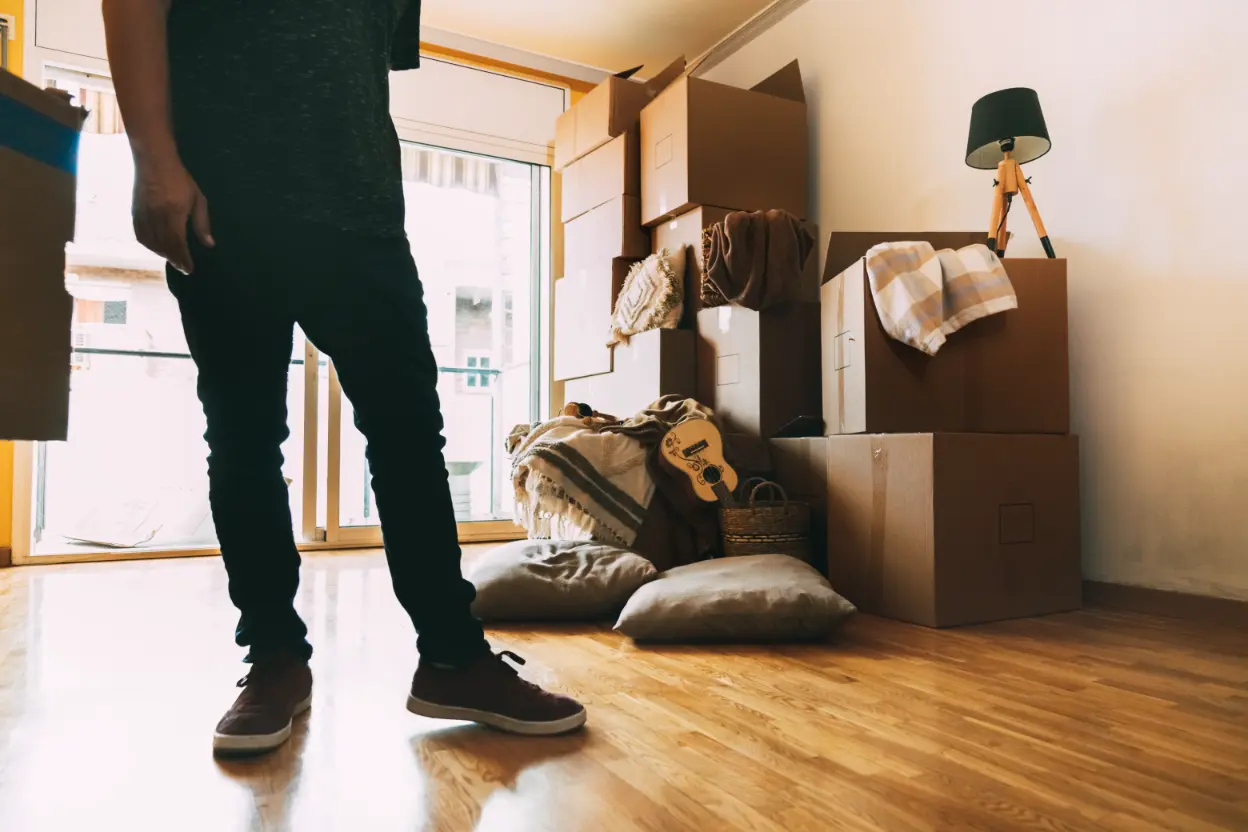It’s not always possible to have the luxury of remaining in the same area for an indefinite amount of time. If you’re a frequent relocator, you should expect to find yourself surrounded by cardboard boxes and packing tape at some point in the not-too-distant future.
Look no further than this moving checklist if you want things to go more smoothly this time around. Not only does it describe what needs to be done, but it also specifies the best time to accomplish particular activities in order to reduce the amount of stress involved. If you print it out, go through each thing on the list week by week, and cross each one off as you do it, maybe the two words that conclude your next move will be “This was easier than I thought.”
8 Weeks Before
Research Moving Services
The first step is probably the most important, hence it should be done well in advance to prevent the headache of being disorganized. You should research a moving company to make sure that all of your household is relocated on time and in one piece. Get acquainted with your choices and your financial constraints right away. If you end up needing professional movers, you may find several options of moving packages offered by STAR International. You can feel confident that your move will be handled professionally by a reputable moving company that is properly licensed and insured. Here you may learn more about the factors to consider while deciding on a suitable mode of relocation.
Visit Your New Community
Make sure you give the new neighborhood a visit before you relocate there. Being there in person will allow you to get a better sense of the many neighborhoods and facilities that the region has to offer.
Budget Accordingly
You should calculate your total moving costs before deciding whether to hire movers or do it yourself. A long-distance relocation with a moving company will cost roughly $5,000. On the other hand, the cost of a local relocation may be around $1,000. If you have to relocate because of your employment, you should ask your prospective employer if they would reimburse you for your costs.
Give Notice to Your Landlord
You must notify your landlord of the impending relocation. When moving out, many contracts require renters to provide their landlords at least 60 days’ notice. With this in mind, before making any relocation arrangements, double-check your lease agreement for explicit specifics on how to terminate it.
7 Weeks Before
Get Estimates from Professional Movers
To acquire a price, contact at least three moving companies. To minimize surprises, have the movers evaluate your goods in person or do a video examination before providing you with moving estimate. In addition, inquire if the estimate is non-binding, binding, or binding not-to-exceed. STAR provides a free and accurate in-home move estimate, and full-service moving, including packing, unpacking, and storage facilities.
Reserve a Storage Unit
Renting a storage unit is an excellent alternative for individuals moving to a new home, whether you need temporary storage while unpacking or a long-term solution for your clutter. Consider using STAR to reserve a storage unit. We have 32,000 square feet of clean and secure storage space.
6 Weeks Before
Schedule the Movers
Time to call in the movers! Keep in mind that the cost of your relocation will vary depending on the day, week, and month that you choose. Most likely, you will incur more costs if you want to relocate during the peak moving season (May–September). This is also true for weekend relocations. If money is limited, schedule your relocation for a weekday during the off-season.
Make Travel Arrangements
Traveling a long distance for the move? You shouldn’t wait until the last minute to book your flight, rental vehicle, or hotel. If you plan your trip soon, you may save money.
Contact Health Insurance Provider
If you want to be sure you’re covered for medical expenses both before, during, and after a relocation, call your health insurance company. Moving to a new area code or city may need a change to your current plan. However, if you must relocate because of your employment, and your firm maintains offices in several parts of the country, your health insurance may not change.
Make Note of All Tax Deductible Moving Expenses
Get started keeping track of your deductible moving costs now. This might include money spent on relocating or on charitable gifts from your home.

5 Weeks Before
Start Using Up Refrigerated Food and Pantry Items
It’s a good idea to clean out your fridge and pantry before relocating, unless you intend to take the food with you. The non-perishable items you collect may be delivered to a local food bank. There are also companies like Move for Hunger which focus on delivering food from households that are moving to charities. These movers will collect food that their clients no longer want and give it to charities in need.
Donate Possessions
Start getting rid of things well in advance of the move so that you may minimize the amount of stuff you have to transport. To get started, make a list of all the things in your home that you would want to give away. Large pieces of furniture may be picked up for free by contacting your local Salvation Army, Habitat for Humanity, or Goodwill. Donation receipts should be kept for tax purposes, so don’t throw them away!
Update All Memberships
Do you belong to any clubs, gyms, or community groups? Most subscription services need at least 30 days’ notice before a membership may be suspended or canceled. It’s imperative that you cancel or reassign your membership immediately.
4 Weeks Before
Dispose of Hazardous Items
You may forget about transporting or discarding any combustible or otherwise dangerous materials in your usual garbage collection. The proper disposal of paint, aerosols, fertilizers, propane tanks, loaded firearms, fire extinguishers, gasoline, pyrotechnics, and pool chemicals requires some forethought. A trip to the nearest hazardous waste facility drop-off may help you get rid of these things in time for your move.
Notify Friends & Family of Your Move
Now is the moment to let everyone know you’re moving out of their area if you haven’t already. Short on time to inform them personally? You may reach them by sending them an email or calling them. Sharing your relocation news on social media is another simple and effective option.
3 Weeks Before
Transfer Utilities
You should contact your utility companies to inform them of your impending relocation many weeks in advance. Cable & Internet, Water & Sewer, Gas & Electricity, Satellite & Security, Trash & Phone are all part of the Utilities bundle. Utilities might be transferred if you’re relocating inside the same city. However, new residents need to investigate local utility providers and arrange for installation dates before they may settle in. Before moving into your new house, verify that essential services like power and cable are activated.
Pay Any Unpaid Parking Tickets
If you think you may have parking citations that are overdue, check with the relevant authorities in your area. Thankfully, most municipalities allow parking fines to be paid conveniently online or via the mail.
Change Social Security & Medicare Mailing Address
If you get Medicare or Social Security payments, you need to change your address online before you move.
2 Weeks Before
Transfer Your Prescriptions
Your current pharmacy may not be convenient for your new location, therefore now is the time to switch them. You should also pack a month’s worth of medicine to help you through the first few weeks in your new house if you need to.
Order New Furniture & Décor
Analyze your blueprint and make a list of what you still need. It’s best to purchase large furniture pieces like a sofa, sectional, or bed at least two weeks before you move in.
Secure a Parking Spot for the Moving Truck
Plan beforehand for where to park the moving truck on the day of the move. If you’re going to use professional movers, you should provide them the parking information as soon as feasible. Those who reside in a congested city may also need a special parking permit.
Gather All Warranty Information & Manuals
Save time and effort for the next occupant by compiling appliance and electronics warranties, user guides, and receipts. If you’re moving out, simply leave them in a convenient spot.

1 Week Before
Clean Old Home
Before you move out, make sure the previous place is clean. You may avoid a cleaning fee or deduction from your security deposit with just a little amount of work. Don’t forget to give the fridge and pantry a good scrub down, too.
Inspect Old Home with Landlord
Before you officially move out, schedule a last walkthrough with your existing landlord. Talk about any potential damage deductions with your landlord. Keep in mind that resolving a disagreement face-to-face is usually more successful than trying to do it over the phone.
Take Care of Trash Removal & Recycling
Finalize recycling and garbage collection plans. If you plan on moving out before the scheduled garbage collection day, ask your neighbors to return your trash can to its proper location following collection. If you have time before you move, you may also want to take advantage of the services offered by your neighborhood landfill and recycling center.
Day Before
Pack Suitcases & Essentials
Make sure you have all of your belongings packed into luggage the day before you move. These should include your first week’s basics, such as pajamas, toiletries, clothes, shoes, prescriptions, pet and infant supplies, and any vital documents or valuables. The main moving day boxes should include essentials such as garbage bags, light bulbs, scissors, tools, flashlights, paper towels, toilet paper, and bedding.
Tell Neighbors About Your Move
Make sure your neighbors know you’re moving if you belong to a HOA or share a driveway with them. This is the courteous thing to do and will allow them plenty of time to reposition their vehicles.
Moving Day
Make a complete list of your possessions. This way, you can monitor the belongings you’re moving and the items the movers are carrying for you. Check your driver’s inventory sheet as well. Make a note of everything that is missing or damaged. Taking pictures of sensitive things, such appliances or lights, may help with insurance and liability claims.
Before you leave your house, give it one more thorough look-over to make sure you haven’t forgotten anything. Look in places that are easy to overlook, such as the bathroom, the laundry room, the kitchen, and the dishwasher.
Give the keys to the landlord or new owners unless you intend to return after the relocation to finish up any unfinished business.














